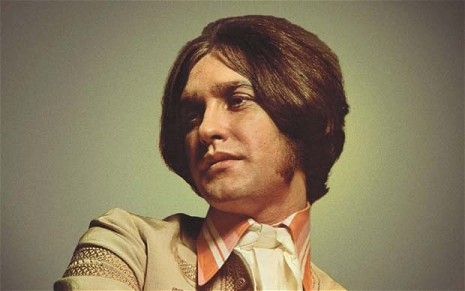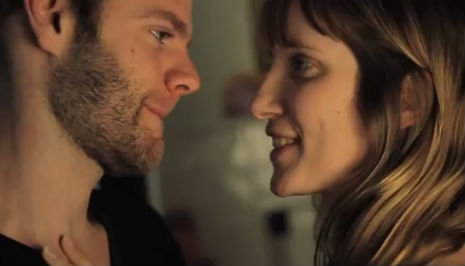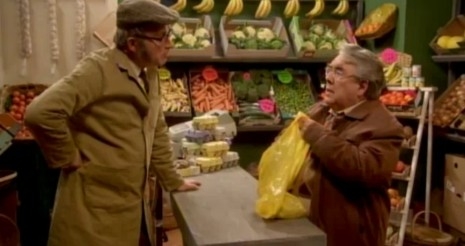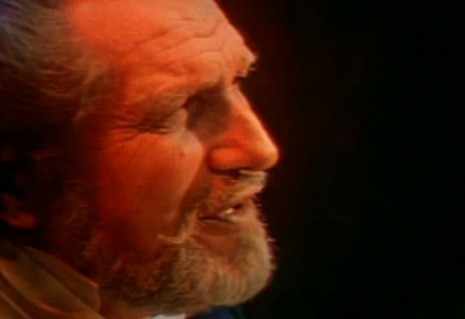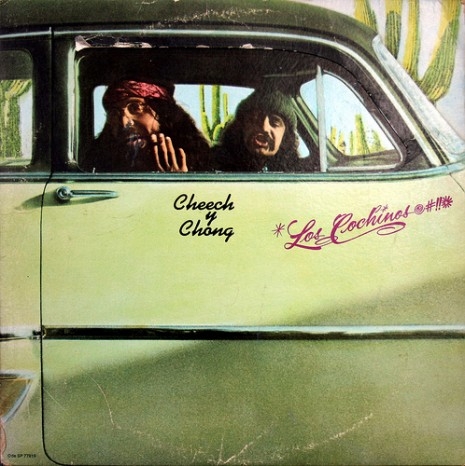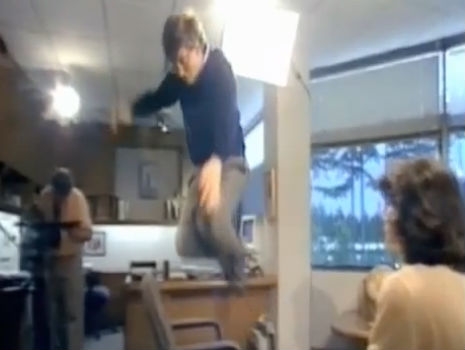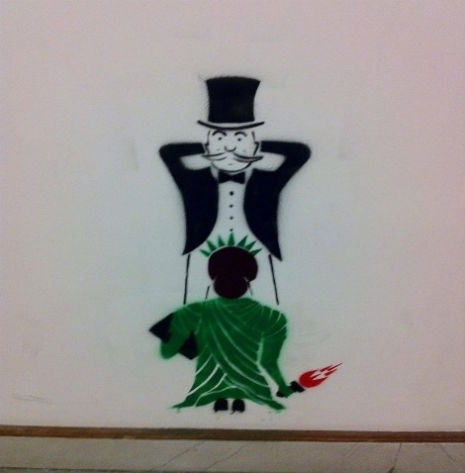
This is a guest editorial from Dangerous Minds reader Em, expanding on some pointed commentary he’s made elsewhere on this blog. Em—who’ll keep his last name to himself, thank you very much—works in the financial industry:
During the 2008 economic crash I was employed by a large British multinational bank and, as a result, watched from abroad as the economy of my home country collapsed. Now that I’m employed by a big US multinational here in the Citi of New York, my opinion about what happened hasn’t really changed. Unfortunately, until the recent Occupy Wall Street protests, it looked as if the right was going to successfully rewrite the story of what caused the US financial collapse by knitting together their usual mishmash of half-baked economic nonsense while the so-called ‘left’ (ie, anyone who didn’t buy into the rapidly solidifying narrative) sat on the sidelines, apparently unable to counter these idiotic and demonstrably false notions. You know the theories: Rich people create jobs, Unions kill competitiveness, and the financial collapse was caused not by too little government intervention, but too much, through the quasi-private Fed. In other words, all the things that seemed directly opposite to what the real causes were (and continue to be) of the US’s fiscal woes.
The reality, of course, is just the opposite of what’s often said, and all you really need to do is take a quick look at the facts.
Put simply, the problem with our current economic situation in the US is that the middle class was effectively de-capitalized starting in the late 1970s and in particular starting with the presidency of Ronald Reagan.
This matters because it’s not the wealthy that create jobs, it’s the middle class. A fact: 65% of all job creation in the US occurs in companies with 50 employees or less. This is clearly not the realm of the ultra-rich, who have no real desire to create another large company. In fact, the idea that cutting the personal taxes of, for instance, the CEO of my company would create more jobs is laughable. Would he use his own money to hire additional employees? The idea just doesn’t make any sense. No, jobs are created by the middle class as they try to become wealthy, but only if the middle class is sufficiently equipped with capital, education, free time and other basics.
One accidental byproduct of the labor movement of the early 20th century was a strong middle class that had access to education and other basic services. More importantly, with Union wages, they now had some excess capital which they bet on countless small opportunities they saw in every sector of the economy. As those businesses developed, they gave rise to the unprecedented economic growth and prosperity of the 1950s and 1960s and, of course, plenty of jobs. A particularly timely example in fact can be seen in the story of Steve Jobs, who came from working class parents and started Apple computers in a garage. All of the jobs created by Jobs at Apple computer were therefore a result of second-generation working class prosperity and capital, combined with a solid education system. That’s the American story, not “give billionaires more money and they’ll make more jobs”.
So what happened to our economy? What caused the fiscal collapse? Simply put, the financial collapse of 2008 was the result of a long-term assault on the working class, particularly in the form of Union Wages. Starting with Ronald Reagan and his sacking of the striking Air Traffic controllers, the US began a long, steady assault on Union power and wages in the US. For instance, in 1983 US Union membership was at around 20%, whereas today it is merely half that. Globalization hasn’t helped, as workers were repeatedly told that their high union wages were causing their jobs to be sent overseas. As a result, through the 90s and into the first decade of the 20th century, the working class had been in effect de-capitalized and prevented from investing in all of those opportunities that working people have always seen out of the corner of their eye, as they shoveled coal, or wired up office buildings, or sold home heating. And because all of those businesses were never started, they therefore never grew into larger businesses thus generating all of those jobs that the businesses of previous generations had created.
Of course, there have been ‘drugs’ administered that allowed us to ignore what was really happening and the vast gaping wound that was developing: One of these drugs was ultra-cheap capital, and as the wealthy (who were already wealthy and didn’t need to create new businesses) looked for places to put their money, Wall Street obligingly created special derivative securities that allowed, theoretically, the true risk to be tamed and (they claimed) packaged, so that the wealthy could invest in the housing market, this latter of course spurred on by the cheap money the Fed was throwing out limousine windows on The Street.
Were it not for the housing bubble, we might have noticed that the economy had been hollowed out and shipped largely overseas. We therefore convinced ourselves that everything was going fine, and that ‘laissez faire’ capitalism was continuing to deliver the goods. This was, of course a lie: This was by no means laissez faire and those most particularly hoodwinked by the shell-game economy thought that the Fed was to blame.
Of course, the Fed was sort of to blame, but the fact was that the Fed was really just overextended, using its special powers to cover the deepening hole in the economy.
You could, of course, argue that all of this was inevitable: With China and the BRIC countries coming on line and driving the cost of manufacturing down to practically nothing, the Unions had to give up their gains or else jobs would have departed the US even more quickly.
That, of course, is also bullshit. An interesting fact: The two European countries with plenty of extra cash, Germany and Sweden, are also the two most unionized countries in the western world. What? Yes: Germany in particular is practically pwnd by its auto worker unions, and the result is a stable and prosperous economy, with plenty of cash left over even after absorbing the economic basket case of East Germany (remember them?). Meanwhile, Mercedez and BMW continue to clobber Detroit, so the problem clearly isn’t too much union power in the US: It’s too little.
Come to think of it, why is it that unionized workers in the US have had to compete with third-world wage slaves working in dangerous factories that belch hideous levels of pollution into the rapidly heating skies? Of course, a truly protectionist trade policy would make US goods uncompetitive and keep us beholden to US factory bosses. But a carefully deployed trade policy that protects US union gains by making the playing field level, that’s what is necessary. In other words, there should be significant tariffs on goods coming into the US that are made in countries that do not have real pollution controls in place, or that subject their workers to inhumane or dangerous working conditions.
So that’s it: The US sold out the middle class in order to benefit a group of extremely wealthy individuals who aren’t equipped to efficiently utilize such high concentrations of capital. The right argues that this is good for business and results in jobs, but the reason this clearly does not work is because the right’s economic theories are based on a revisionist history in which the US unions never existed. The unions did exist in the US, and for a time they were reasonably (though not overly) powerful, and to that same extent we enjoyed a few generations of prosperity that will never return unless we examine the facts carefully and divest ourselves of all of the pseudo-economic theories of the right.
About the author: Em was a founding member (with John Cale and others) of the New York punk band Doppler Effect in the early 1980s. After living in China in the late 80s, Em worked in the physics and electrical engineering space until 2002, at which time he moved into the financial world. In July of 2010, Em returned to the US after living in London for several years. He is a member of the UMOUR art/event collective. He blogs at The Magic Lantern, his"litterbox of the soul.”
